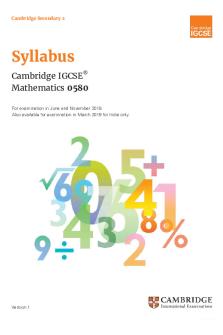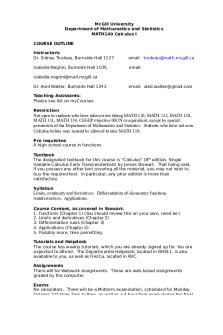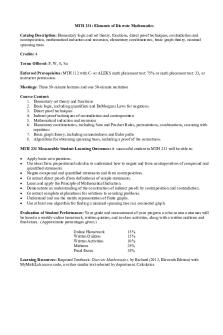Syllabus Math 1301 PDF

| Title | Syllabus Math 1301 |
|---|---|
| Author | Yubing Yang |
| Course | Accel Single-Var Calc II |
| Institution | Vanderbilt University |
| Pages | 4 |
| File Size | 155.1 KB |
| File Type | |
| Total Downloads | 33 |
| Total Views | 157 |
Summary
syllabus...
Description
VANDERBILT UNIVERSITY Department of Mathematics Math 1301 – Calculus Fall 2019 4 hours credit
Lecture Section: 07 Recitation Section: 08 Recitation Section: 09
Room: SC 1117 Room: SC 1312 Room: SC 1320
Time: MWF 11:10a-12:00p Time: T 12:10p-1:00p Time: T 1:10p-2:00p
Instructor: Frank Wagner Office Phone: (615) 322-2022 email: [email protected]
Office: SC1227 Office Hours: M 4:00p-5:00p; T 2:00p-3:00p R 1:00p-2:00p
Teaching Assistant: David Chan email: [email protected]
Office: SC1227 Office Hours: WF 10:00a-11:00a
Text: Calculus, 8th edition, by James Stewart Prerequisite and Description: Math 1301 is the second semester accelerated calculus offering 4 hours credit. The course covers single variable integration; integration and differentiation techniques for exponential, logarithmic, and other transcendental functions; arc length, surface area, and other applications of integration; separable differential equations and applications; parametric plane curves; polar coordinates and applications; conic sections; and infinite sequences and series. Enrollment in Mathematics Courses: The Open Enrollment Period ends on Wednesday, August 28th. This is the deadline for students to add a course or to make other changes in YES. Between August 29th and September 4th, any withdrawals or adjustments in level or in grading status must be completed using the add/drop form. If only the "DROP" section of the form is filled out, the instructor may sign the form. If a student wishes to make any change that involves filling in the “ADD” section of a drop/add form (whether or not it also involves filling in the “DROP” section), then the student must see the DUS (John Rafter) or the Assistant DUS (Jakayla Robbins) in person. Per Math Department policy, the only change to a math course that will be approved is a change to the level of the course (e.g. switching from Math 1301 to Math 1300 or vice versa).
Calculators: Calculators will not be used in this course. Classroom Policy: Students are not allowed to use electronic equipment such as cell phones, music players, or computers during class. Texting during class is not acceptable. Honor Code: All work submitted for credit must be the student’s own and is subject to the provisions of the Vanderbilt Honor Code. Details can be found at the Honor Council web site (http://studentorgs.vanderbilt.edu/HonorCouncil/). Accommodation Procedure: A student who needs course accommodations due to a disability, special arrangements in case the building must be evacuated, or has emergency medical information that needs to be shared with the instructor, should contact the instructor in person as soon as possible. Student Access Services (SAS, 615-343-9727 or https://www.vanderbilt.edu/student-access/) at Vanderbilt provides specific accommodations for students with physical or learning disabilities. Upon receiving appropriate documentation from the student, the SAS will make arrangements with the instructor for the lecture accommodations. Students who need special accommodations for exams must follow the procedure listed in the Unit Test/Final Exam Conflicts section of this syllabus. Please note that students who anticipate a conflict or the need for an accommodation must submit forms and documentation to their instructor at least one week prior to the test date. Late requests will either be denied or will result in an automatic deduction from the exam score.
Complaint Procedure: If at any time during the semester the student wishes to discuss class procedure, schedule, grades, or any class situation, contact the instructor during regularly scheduled office hours or via email. Both office hours and email address are given above. Any complaint that cannot be resolved directly with the instructor should be referred to the Director of Undergraduate Studies (John Rafter in SC1332) or the Assistant Director of Undergraduate Studies (Jakayla Robbins in SC 1428).
Attendance: The student who misses a class meeting is responsible for any assignments and/or announcements made. Office hours will not be utilized to re-teach material presented in class. The stated attendance policy of the College of Arts and Science applies in this course: Students are expected to attend all scheduled meetings of classes in which they are enrolled; they have an obligation to contribute to the academic performance of all students by full participation in the work of each class. … The faculty of the College of Arts and Science recognizes that occasions arise during the academic year that merit the excused absence of a student from a scheduled class or laboratory during which an examination, quiz, or other graded exercise is given. Examples include participation in sponsored university activities (e.g., debate team, varsity sports), observance of officially designated religious holidays, serious personal problems (e.g., serious illness, death of a member of the student’s family), and matters relating to the student’s academic training (e.g., graduate or professional school interviews). Conflicts arising from personal travel plans or social obligations do not qualify as excused absences. Homework: Daily homework assignments are listed on the syllabus and should be completed prior to the next class. Each student should keep all completed assignments in a notebook and bring this notebook to class. Homework Help: Individual instructors and TAs have regularly scheduled office hours to answer student questions outside of class. The Department of Mathematics also sponsors drop-in tutored study halls in the math building that will start during the second week of classes. The Tutoring Services Office of the College of Arts and Science offers free individual tutoring and other related services. Information can be found on their web site at https://as.vanderbilt.edu/tutoring/helpdesk/mathematics.php Quizzes/Problem Sets: Weekly 15-minute quizzes will be administered during discussion sections throughout the semester. Each student’s two lowest quiz scores will be disregarded. Additionally, weekly problem sets will be due at the start of Wednesday lectures. These problem sets will consist of multi-step problems that emphasize problem-solving strategies and clear writing. Each student’s two lowest scores on the problem sets will be disregarded. Tuesday Discussion Sessions: TAs will conduct the discussion hour for this course on Tuesdays. Sessions will involve answering questions over homework problems, quizzes, or tests, administering quizzes, completing worksheets, and occasionally covering new material. Discussion is the fourth hour of a four-hour class, so attendance is expected. Unit Tests: Four 100-point unit tests will be given during the semester. The dates and times of these tests is posted on the course schedule. Note that all unit tests will be given at night from 7:00 – 8:15pm. All work must be written on the test pages. Work done on scratch paper will not be graded. Attendance on these dates is compulsory; otherwise, a grade of zero will be recorded. Any student who has an excused, documented conflict with a test time must follow the procedure listed in the Unit Test/Final Exam Conflicts portion of this syllabus. Students who have accommodations through the SAS office have a conflict with the normal exam time and must follow the procedure listed in the Unit Test/Final Exam Conflicts portion of this syllabus. Under no circumstances will a test be given on an alternate date. Please note that students who anticipate a conflict must
submit forms and documentation to their instructor at least one week prior to the test date. Late requests will either be denied or will result in an automatic deduction from the exam score. Final Examination: A 150-point comprehensive final examination will be given on Thursday, 12 December 2019 from 7-9pm. No alternate exam will be given. Any student who has an excused, documented conflict with a test time must follow the procedure listed in the Unit Test/Final Exam Conflicts portion of this syllabus. Please note that students who anticipate a conflict must submit forms and documentation to their instructor at least one week prior to the test date. Late requests will either be denied or will result in an automatic deduction from the exam score. Emergency situations are discussed in the Unit Test/Final Exam Conflicts portion of this syllabus. Unit Test/Final Exam Conflicts: Unit Tests will only by given on the date listed in the course schedule. There are some legitimate reasons why a student may need to take a unit test or the final exam on the same date at a different time and/or location from the rest of the class. Emergency situations which require a student to miss an exam will be covered at the end of this section. A student must request a change in exam time if: • the student has or expects to receive documentation from the SAD office indicating that the student qualifies for extended time or special exam accommodations, (SAS students: note that the Department of Mathematics administers most calculus exams. The SAS office only administers calculus exams in extreme circumstances.) • the student is required to participate in a university sponsored event that conflicts with the scheduled exam time, • the student is taking another class that meets during the scheduled exam time, • the student is a participant in a required religious observance that conflicts with the schedule exam time, or • the student has a scheduled event related to their academic training such as a job or graduate school interview. Requests due to personal travel plans or social obligations will be denied. The procedure for requesting a change in exam time is outlined below. 1. The student must obtain a Request for Change in Exam Time form from their instructor. The instructor has either attached the form to this syllabus or posted the form in Brightspace. 2. The student must complete the form and staple any supporting documentation to the form. Students who have the same conflict for multiple exams only need to complete a single form. The form allows you to select more than one exam. 3. The student must give the form to their instructor AT LEAST ONE WEEK PRIOR TO THE EXAM. Students who are waiting for documentation, including those waiting for documentation from the SAS office, are still required to submit the Request for Change in Exam Time form at least one week prior to the exam. These students should include a note explaining that they are waiting for documentation and detailing who should be providing the documentation (such as the SAS office, Coach John Smith, or Professor Sally Ray). Note that late requests will either be denied or will result in an automatic deduction from the exam score. Furthermore, no accommodations will be made for requests submitted after 4:00PM two days before the exam. In particular, no accommodations will be made on the day of the exam or the day before the exam. 4. After the student submits the form to their instructor, the form will be processed. Processed forms indicate if the request has been granted or denied. If the request has been granted, processed forms also contain instructions indicating what the student must do to take the exam. The instructor will give the student a copy of the processed form. Students should keep a copy of the processed form and bring it with them to the exam. Emergency Situations: This section covers students who miss an exam because of an excused absence due to an emergency situation. Students who have an excused absence due to an emergency situation, such as a serious illness (influenza, a concussion, an illness requiring a hospital stay, etc.) or the death of a family member, should notify their instructor as soon as
possible via email. Instructors have the right to request documentation of the excuse. Students who must miss a unit test or the final exam because of an emergency situation are not required to complete a Request for Change in Exam Time form. If a student misses one unit test due to an excused absence, the student may replace the missed unit test score with the final exam percentage. If a student misses two or more unit tests with excused absences, the make-ups will be handled on a case by case basis. Students who do not miss any unit tests with excused absences will be allowed to replace their lowest unit test score with the average of that unit test and the final exam percentage, if it is to their advantage. Students who miss the final exam because of an emergency situation will receive an M grade (if they are passing the class) and will have to take the final exam at the beginning of the fall semester. Grading Procedure: Each student will have the following six scores. The total number of possible points for the semester is 700. Quizzes Problem Sets Test 1 Test 2 Test 3 Test 4 Final
75 75 100 100 100 100 150
Students who do not miss any unit tests with excused absences will be allowed to replace their lowest unit test score with the average of that unit test and the final exam percentage, if it is to their advantage. Letter grades will be based on a general 10-point scale, where 90-100 guarantees a grade in the A range, 80-89 B range, 70-79 C range, 60-69 D range, with plus or minus grades assigned as appropriate....
Similar Free PDFs

Syllabus Math 1301
- 4 Pages

UTA Math 1301 Formula Sheet
- 6 Pages

Math syllabus
- 40 Pages

Fall+2017 +-+Syllabus+-+CS+1301
- 4 Pages

1301 Fall 2020 Online Syllabus
- 7 Pages

Math 171 Syllabus - syll
- 3 Pages

Math Standard Syllabus
- 96 Pages

Syllabus MATH 140
- 2 Pages

Math 111 F21 - Syllabus
- 7 Pages

MATH 165 Syllabus
- 9 Pages

Math gre w2015 syllabus
- 2 Pages

Syllabus Math 221
- 4 Pages

Math 114 Course Syllabus
- 9 Pages

Discrete math syllabus
- 2 Pages

Math+10+Horizontal+Syllabus
- 4 Pages

Syllabus of Math 115
- 4 Pages
Popular Institutions
- Tinajero National High School - Annex
- Politeknik Caltex Riau
- Yokohama City University
- SGT University
- University of Al-Qadisiyah
- Divine Word College of Vigan
- Techniek College Rotterdam
- Universidade de Santiago
- Universiti Teknologi MARA Cawangan Johor Kampus Pasir Gudang
- Poltekkes Kemenkes Yogyakarta
- Baguio City National High School
- Colegio san marcos
- preparatoria uno
- Centro de Bachillerato Tecnológico Industrial y de Servicios No. 107
- Dalian Maritime University
- Quang Trung Secondary School
- Colegio Tecnológico en Informática
- Corporación Regional de Educación Superior
- Grupo CEDVA
- Dar Al Uloom University
- Centro de Estudios Preuniversitarios de la Universidad Nacional de Ingeniería
- 上智大学
- Aakash International School, Nuna Majara
- San Felipe Neri Catholic School
- Kang Chiao International School - New Taipei City
- Misamis Occidental National High School
- Institución Educativa Escuela Normal Juan Ladrilleros
- Kolehiyo ng Pantukan
- Batanes State College
- Instituto Continental
- Sekolah Menengah Kejuruan Kesehatan Kaltara (Tarakan)
- Colegio de La Inmaculada Concepcion - Cebu